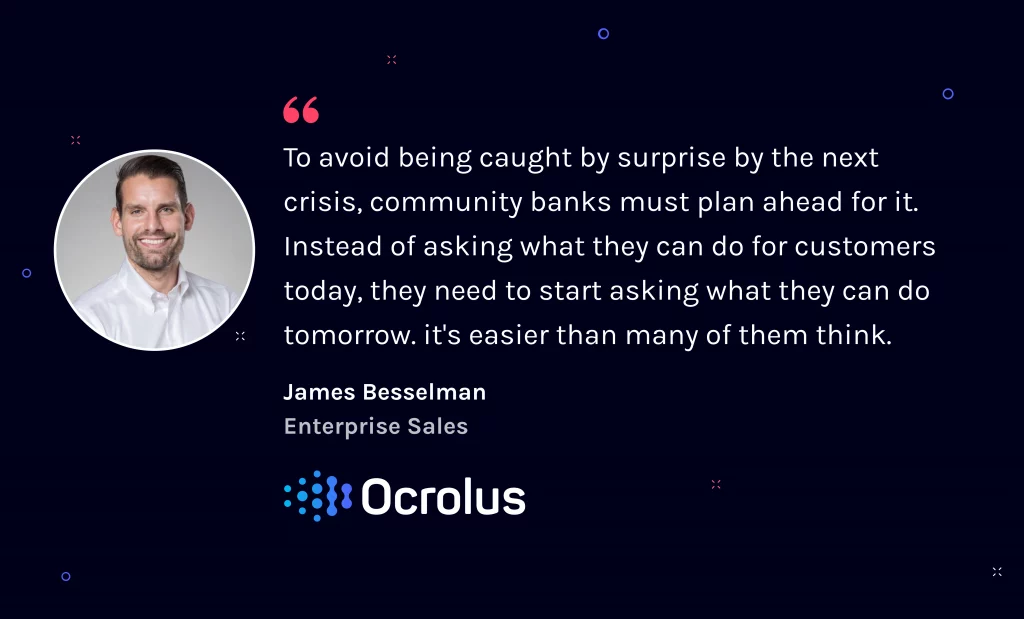This website uses cookies so that we can provide you with the best user experience possible. Cookie information is stored in your browser and performs functions such as recognising you when you return to our website and helping our team to understand which sections of the website you find most interesting and useful.
Innovation in Banking: Now is the time for community banks to invest in new technologies

The pandemic was a challenging time for many community banks, but that doesn’t mean it’s time to retrench after the fact. By planning ahead and proactively investing in banking innovation, community banks can prepare themselves to weather the next crisis — and make the most of future opportunities.
Moving beyond a reactive mindset in banking
No financial institution could have predicted the COVID-19 crisis, but community banks may have been less prepared than most. A July 2020 study found that unlike larger banks, many community financial institutions were not prioritizing the development of digital tools and other innovations in banking, and instead remained focused on branches as their primary service channels during the pandemic.
Customer service is generally considered community banks’ greatest strength, but it can be a double-edged sword. By its nature, customer service is reactive: Banks are responding to the customer’s immediate needs, asking “What can I do for you today?” This emphasis can leave businesses without the tools and solutions — digital or otherwise — they need to respond nimbly to change.
Today, community banks are facing a different world. Customers are sticking with digital banking for the long term — 87% plan to continue using the digital banking tools that they adopted during the pandemic, according to BAI. At the same time, rock-bottom interest rates have made it harder for small financial institutions to turn a profit. The financial services landscape has permanently changed, and doubling down on customer-centric tactics like sending out postcards or hosting giveaways won’t fill the gap.
To avoid being caught by surprise by the next crisis, community banks must plan ahead for it by investing in community banking technology. Instead of asking what they can do for customers today, they need to start asking what they could do tomorrow. It’s easier than many of them think.
Seizing new opportunities to adapt to community banking technology
Adopting new technology can be intimidating. Many community bank leaders may feel their teams lack the time, budget or expertise to make use of tech solutions. But investing in banking innovation doesn’t mean becoming a fintech company overnight. Digital transformation can be gradual: Many tech solutions integrate with existing manual infrastructure, like Excel spreadsheets, so banks don’t have to rebuild their systems from the ground up.
Even just setting aside time and resources to think about the future of banking and community financial institutions’ place in it can be helpful. If a bank isn’t ready to adopt a new best practice or technology yet, they should still know exactly what they’re saying “no” to. And simply knowing what options are out there and what it would take to implement them makes it easier to move fast when the time is right to invest in new community banking technology.
One way to support this future-focused thinking is to create a working group or task force dedicated to banking innovation and technology. For example, this was the model followed by New Jersey’s Cross River Bank, and it allowed them to move quickly to capitalize on a major opportunity during COVID-19.
When the Paycheck Protection Program (PPP) was announced, Cross River leadership saw a chance to boost their loan volume — if they could automate their underwriting and application processing in time for the April 3 program launch. Because the innovation team had prior knowledge of the fintech landscape, they were able to contract with the right vendors quickly to bring their solution online in only eight days. The effort was a success: Despite holding only $2.5b in assets, Cross River issued more than 198,000 PPP loans totaling over $6.5b by July 31, making it the fourth-largest issuer of PPP assistance in the country.
Thinking ahead to the future
Not every community bank is ready to commit to the level of tech investment Cross River made for PPP, but every community bank should be thinking about the future and how they can innovate. Almost a year into the pandemic, the economic situation is still evolving, and banks of all sizes must be prepared to address new developments.
For example, small business loan volume started to pick up again after plummeting at the beginning of the pandemic. At the same time, the ongoing disruption from COVID-19 made businesses creditworthiness difficult to judge. However community banks should have still been thinking about how they could innovate to meet this challenge and seize the opportunity to boost loan volume during the pandemic.
With a bit of long-term planning and a proactive attitude toward innovation in banking, community banks can get ready to meet new possibilities with agility. The future is theirs if they reach out to grasp it.
Ready for more insights like this from Ocrolus? Subscribe to our newsletter to stay up to date on the latest trends and insights for the industry.





